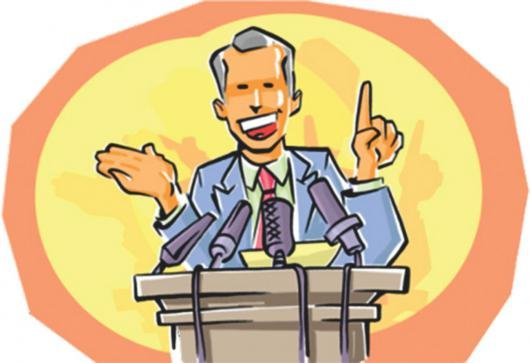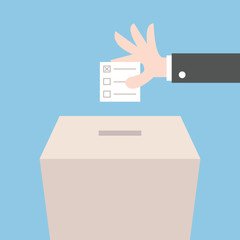Should Politicians Vote Only for the Majority?
If you have been a reader for a while you might know I love playing devil’s advocated, so I had a thought I wanted to explore. The idea of what is right and wrong is obviously very much subjective. There are easy examples like the death penalty or immigration, but what about examples that aren’t so clean cut? Should politicians who are elected by their constituency vote according to their own morality or should they vote in accordance with how the people they represent would vote, even if it might clash with their own sense of right or wrong?

There is no doubt that the people we elect and put in power are meant to represent us, but what if the majority that they represent are for something that might be subjectively wrong? A semi relevant example of this currently might be what is currently going on in Germany with the acceptance of refugees and the disconnect between the voters and the politicians. Angela Merkel has, on multiple occasions, accepted refugees when the vast majority of the German citizens no longer want to bring in anymore. She might feel it is her moral duty to accept them, but she is disregarding the opinion of the people.
This might be an understandable case, but what if we take it to the extreme and look at something similar to late 1930s Germany. What if the majority of your citizens decided one day they want to imprison all the Mormons living in a country, for no other reason than their religion? Should the politician that was elected to power represent the views of his people at the expense of the minority? This really is not an easy question to answer and I believe it comes down to what role you think politicians should play in the government. If you believe they should represent the majority opinion no matter what, then you risk having moralities clash.

If you believe that a politicians duty is to make the vote that is “right” or moral , according to their beliefs, regardless of what the majority thinks, going against the public might not clash with your views. There is really no easy answer for this question, as there are a million views on the subject, all equally correct in their own way. Personally I think we elect our officials to represent the majority, but also to make their own decisions equally depending on what they believe is the right thing to do. If the majority disagrees with how the politician is acting then they will be moved out of office to bring someone else who better represents the ideas, in.
Most things in life don’t have a vast majority support as we see with many elections. Usually when given the choice between two things, the results tend to be semi-equally split. However personally I think this is why the person voted into power should use their own intuition. You might disagree which is completely fine, but I think having politicians having the power to make the ultimate choice over the public which can sometimes be rash and impulsive, yields the best outcomes. Finding a middle ground that represents all the people they represent is their job, not just the majority.

Thanks to @Elyaque for the badges
Perhaps the best solution is to replace politicians by corruption free robots, where every voter can vote on each decision the robot are going to chose.
The majority of voters can then chose how the robot is going to vote. Then we will have a true democracy.
I agree. It's a balance. On the one hand, their job is to speak on behalf of the constituents. But it's also their constituents job to elect someone who's morals and values align closely to their own. On top of all of that, politicians need to balance the wants of the majority with the needs of the minority. It's a bit like parenting; you do what's best for the family as a whole, while also making sure that each person is looked after.
Unfortunately, my faith in politicians is minimal. Too many times it seems that they put their own interests and the interests of their political party far above those of the people they represent or are responsible for looking out for.
I completely agree with you. I like the analogy to parenting as well!
this response is pretty much exactly what i was gonna say, though i think you may have said it better than i might have. the balancing act is an interesting one, and while the elected reps should vote mostly according to the will of the people, i doubt that particular action actually happens more often than not.
A representative democracy is representative because the people making the decisions should do the right ones, not what the majority wants (which is hopefully the same of course).
If you wan't to always make what the majority wants, you don't need representatives.
Also the majority often has a hard time respecting the minority, which is essential for democratic process. If you don't respect minorities you just have a dictatorship by popular vote.
In a way it's similar to why we have an electoral college. The common person wasn't and in many ways I think shouldn't be trusted with certain things.
That ancient, outdated abomination is a different topic altogether lol.
And even with the electoral college you ended up with Trump.
[joke]
When Obama was president, the sun never got dark, that's all I say!
[/joke]
i agree with you completely @calaber24p
this is a very delicate issue in many countries... Also in the USA, most politicians elected to congress try to pass bills which may be contrary together views but fear of being voted out by heir constituent makes them go for the majority.,.. Finding a middle ground is the best option...
thanks for this...
keep it flowing
I personally like the middle ground as well which I believe is part of the reason politicians are hated. They can make claims to get elected but sometimes keeping the peace when in office might turn out beneficial for everyone. If you take someone like trump who has pretty much tried to do most of the things he promised on his campaign. He is having trouble actually doing anything other than executive orders because he has not only pushed away democrats from compromise but many republicans as well. Brokering peace and having a less effective albeit somewhat effective policy is probably better for the directions he wants than no policy at all.
very correct... i suggest you become adviser to this politicians as you seem to be well versed i policy issues...
Thanks...find time to check my new post on breast milk for adults
The politician should vote only for policies within their power structure. If the majority wants them to "jail all Mormons", they should vote "no".
In America, if the public wants to change law so that jailing of a religious group is within the delegated powers of Congress, than they can go through the correct channels and have the Constitution amended.
I agree but the power structure is relatively flexible in many cases. This is why the Supreme Court has so many cases it has to delegate on.
Well that's just because we have a government that believes in a "living" Constitution. It can be argued that the Supreme Court rules on things that they have no power to rule on under the original framework. Gay marriage for example. The federal government should have nothing to do with any type of marriage or marriage contract law.
The Court also rules in favor of things that are clearly Unconstitutional for political reasons, but because of the majority, its rulings are upheld by other branches and by the public: Obamacare and Texas v. White for example.
As a voter I want the person I vote for to represent "ME" if they get elected. Otherwise what is the point of voting. If he or she does't vote as I would I will not vote for that person again. This is very simple, a politician is the employee of the people that vote him or her in to office. To many politicians get elected on a platform of lies and and then do what ever they want once elected, it's shameful.
I completely see your point of view, I know a lot of people who feel like you do, but i personally also see danger in only representing a slight majority like 51% . 49% of people will be disregarded.
In most countries a politician represents less then 50%. And they work better then the ones with winner-takes-all elections.
Precisely because you have to also aknowledge views of people that did not elect you.
The broader the needed coalition, the better for the people.
That is true but in order to be re-elected they must make sure not to make to many people angry with the way they govern or the next election might go very badly for them. Also if they vote however they like then the people that put them in office will probably not vote for them next time, but other groups of people might so it's a grand balancing act. I honestly don't know how they do it, I don't think I could ever be a politician.
yes i read ur post mostly and also now this to talk on poticians vote..i think really politicians go to majority side they dont care the rules and the right wrong they only see the with selfish mind @calaber24p sir thherefor i dont like politicians
Nice post thanks!!
I really like your post, your post is very useful for me and I will wait for the next post. Have a good day for your friends
The elected REPRESENTATIVE is supposed to represent! The only real choice is whether to represent majority or minority will (as far as it can be determined).
The representative is always free to vote their conscience if they feel strongly about an issue.
To me it makes FAR more sense to follow the will of the majority over a minority (and Jefferson STRONGLY agreed with me).
I want my representative to follow the will of the majority even IF my personal will happens to be in the minority.
In fact, I would like for YOU ;-) to start a voting block that ONLY elects representatives that vow to follow the voting block's majority will (unless their conscience/intuition/soul REQUIRES otherwise).
In the end, if the representative cannot convince a majority of the "block" that their possibly contrary "conscience" vote was the correct one, then the "block" will vote in a replacement.
Easy peasy :-)